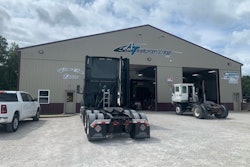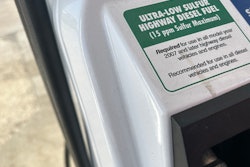Diesel fuel prices have been on a steady decline throughout most of 2023, but just a few weeks ago prices started spiking again.
Between the week ending July 24 and the week ending August 14, diesel has jumped 57 cents. For the most part, trucking is at the mercy of fuel prices and those who control them. There are a few reasons behind the recent spike in prices, and all of them are external factors to trucking.
Joining Jason and Matt this week is Mike Kucharski, vice president of Chicago-area-based JKC Trucking, to explain some of the reasons prices are going up, and some ways trucking companies can weather the storm, as well as advocate for themselves.
Contents of this episode
00:00 Diesel price increase
02:05 Impact on fleets
04:08 Impact beyond the trucking industry
05:02 Lasting effect on the trucking industry and supply chain
06:34 Advocating for better diesel prices
Jason Cannon (00:00):
This week's 10-44 is brought to you by Chevron Delo 600 ADF ultra low ash diesel engine oil. It's time to kick some ash.
Matt Cole (00:09):
Diesel prices are back on the rise. Why is it happening and what can be done about it?
Jason Cannon (00:14):
You're watching CCJ's 10-44, a weekly episode that brings you the latest trucking industry news and updates from the editors of CCJ. Don't forget to subscribe and hit the bell for notifications so you'll never miss an installment of 10-44.
Hey everybody, welcome back. I'm Jason Cannon and my co-host. On the other side is Matt Cole. Diesel fuel prices have been on a steady decline throughout 2023, but just a few weeks ago, prices started spiking again. Between the week ending July the 24th and the week ending August the 27th, diesels jumped about 43 cents.
Matt Cole (00:46):
For the most part, trucking is at the mercy of fuel prices and those who control them. There are a few reasons behind the recent spike in prices, and all of them are external factors to trucking. Mike Kucharski, vice president of Chicago area based JKC Trucking joins us this week to explain some of the reasons prices are going up and some ways trucking companies can weather the storm as well as advocate for themselves.
Mike Kucharski (01:07):
My name is Mike Kucharski and I'm the Vice President of JKC Trucking. We specialize in LTL Freight, which means less than truckload, frozen, refrigerated. We run from the whole Midwest, the whole west coast and back. We have two terminals in California, one in Stockton, California, which is Northern California, one in Santa Fe Springs, which is Southern California. And we do, probably the biggest refrigerated carrier out of the Chicagoland area. What's driving these prices back up? Multiple things. I would say. Obviously the war in Ukraine is not helping, the ban with the fuel for Russia is not helping. I was just reading that the extreme heat that we're having this summer is causing an issue with capacity, and I feel that we've never rebounded back to pre-Covid conditions with the fuel and the pricing. Since Covid, it's been up and down and upside down.
Jason Cannon (02:05):
Mike says his fleet of about 200 trucks saw 47% increase in fuel spend in the first quarter of 2022 compared to 2021, and that's despite using significantly less fuel. Now, JKC also saw a 22% increase in the first quarter of this year compared to last year.
Mike Kucharski (02:23):
Do a picture of what the truckers are dealing with. And us as being a refrigerated frozen carrier, we're burning fuel more because, not only are we burning fuel moving the trucks, all the trailers, the reefers are burning fuel nonstop, and we've had a very hot, scorching summer. So obviously, these reefers have been running nonstop to full capacity, which is also beating us up in the pocket.
Matt Cole (02:50):
It's no secret that higher diesel prices make trucking operations more difficult, but there is also an impact beyond the industry. We'll hear more on that from Mike after a word from 10-44 sponsor, Chevron lubricants.
Jason Cannon (03:01):
Protecting your diesel engine and its aftertreatment system has traditionally been a double-edged sword. The same engine oil that is so essential to protecting your engine's internal parts is also responsible for 90% of the ash that is clogging up your DPF and upping your fuel and maintenance costs. Outdated industry thinking still sees a trade-off between engine and emission system protection, and Chevron was tired of it, so they spent a decade of R&D developing a no compromise formulation.
Chevron lubricants developed a new ultra low ash diesel engine oil that is specifically designed to combat DPF ash clogging. Delo 600 ADF with omnimax technology cuts sulfate ash by a whopping 60%, which reduces the rate of DPF clogging and extends DPF service life by two and a half times. And just think what you can do with all the MPGs you're going to add from cutting your number of regions. But Delo 600 ADF isn't just about after treatment. It provides complete protection, extending drain intervals by preventing oil breakdown. Before, you had to choose between protecting your engine or your aftertreatment system, and now you don't. 600 ADF from Delo with omnimax technology, it's time to kick some ash.
Mike Kucharski (04:08):
It hurts my business depleting, obviously, my cash flow, depleting any profits, putting my company definitely in the red, causing instability. I think one of the worst part is that it keeps me up at night and it's given me plenty of new gray hairs. High diesel prices hurt every aspect of Americans life, period. High diesel hurts truckers, but it also hurts every American because it's essential to supply chain. High diesel bushes up prices, food, clothing, household goods, this proportionately hurts the lower income people. Everyone's feeling the high costs, especially at the grocery stores. When gas prices and diesel prices are high, lower income households don't give up luxuries, they give up necessities. They have to choose between driving to work and putting food on the table. So it'd be one of the things we have to do in this country. We need to get these fuel prices back under control for the American people.
Jason Cannon (05:02):
Looking ahead, if fuel prices continue to rise or level off at a higher point than where prices have been recently, Mike says it could have a lasting effect on the industry and the supply chain.
Mike Kucharski (05:13):
It's going to hurt a lot of truckers. Since 2022, a lot of people jumped into the trucking industry trying to help because we needed capacity. Everybody jumped in because the money was paying good, bought equipment at high prices, and now, we're having the high cost of everything, the extra high cost of diesel, and what we're having right now is, it's really hurting all trackers is volume volatility. Because when you go to a grocery store, products are so expansive. The American people have to choose. They had to change their diets, what they could afford. So when they go to grocery stores and they're not buying products off the shelves, manufacturers cut back in production. And then when you have volume volatility, it even amplifies the problem because, a lot of customers understand. A handful of customers will go to the market, and when they go to the market, they're going to give it to the lowest bidder. And how is this?
Sometimes, it depends what your overhead is. Some owner operators could deal with it, larger companies like us, it's a little harder for us to push through that because our overhead is higher, but we have more capacity. So, there's been times when loads are paying so low, I hate to say this, no owner should ever say this, it's cheaper to park the trucks than run them.
Matt Cole (06:35):
Beyond the obvious of finding fuel discounts through association memberships and fleet cards to avoid paying retail prices at the pump, Mike says there is more trucking can do to advocate for itself when it comes to diesel prices.
Mike Kucharski (06:46):
With the diesel, I would say we needed to, as truckers in the industry, we needed to tell the government, stop exporting diesel. I think that would help. Give us tax incentives. Highway diesel to excise tax, to lower or suspend, provide tax credits. My favorite would be, make America energy impended again, because I think that would be a huge impact in all the diesel prices and the American people. And one of the things I've been saying, we welcome all lawmakers since Covid to sit down with us so we could educate them, and we educate them what we need and what works on the front lines so they could understand the supply chain, how the supply chain operates, so we could discuss the issues and come up with solutions together to get the economy and the supply chain moving again, because I feel there's a huge disconnect because the transportation world and the government.
Jason Cannon (07:47):
That's it for this week's 10-44. You can read more on ccjdigital.com. While you're there, sign up for our newsletter and stay up to date on the latest in trucking industry news and trends. If you have any questions or feedback, please let us know in the comments below. Don't forget to subscribe and hit the bell for notifications so you can catch us again next week.










